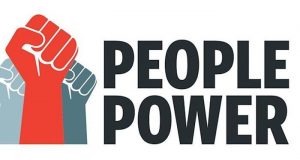(ThyBlackMan.com) News coverage of the mid-term elections focused almost exclusively on the Gubernatorial, Senate and House contests. But several other things of potential national import took place as well. For example…
Did you know that in these mid-terms a Colorado referendum abolished slavery? Bet you thought that happened with the ratification of the 13th Amendment to U.S. Constitution in December of 1865. It did, “except as punishment for a crime…” The exclusion of incarcerated people from being subjected to involuntary servitude has resulted in “convict labor” being used from that day until the  present for all manner of jobs. As recently as the wildfires out west, inmates were used, for example, to fight these blazes – putting their lives at substantial risk – for pennies. The Colorado example should be followed by the other 49 States, finally bringing about slavery’s complete abolition in all forms.
present for all manner of jobs. As recently as the wildfires out west, inmates were used, for example, to fight these blazes – putting their lives at substantial risk – for pennies. The Colorado example should be followed by the other 49 States, finally bringing about slavery’s complete abolition in all forms.
A Florida referendum restored voting rights to returning citizens after they have completed their prison sentences. This is estimated to return over 1 million Florida residents to the voting rolls. This could have made a significant difference in both the races for Governor and Senator had this been in effect at the time of this recent election as people of color make up a disproportionate amount of Florida’s prison population; as everywhere else in the United States. It only seems just that after people have “paid their debt to society” that their full citizenship rights should be restored.
Louisiana, by popular vote, amended its Constitution to finally get rid of its provision allowing felony convictions without a unanimous jury decision. These so-called ‘Jim Crow’ juries could either shield whites from convictions or assure easier guilty verdicts for blacks. This illustrates how even today, we still need to deconstruct the legacies of racial discrimination, like this 120 year old practice, that disadvantage people of color.
Although these referenda did not receive much press attention, you can see how important they are for moving forward the equality agenda. It also demonstrates the power of the ballot box is not only for electing representatives to federal, state and local government offices but can also be used to erase past barriers to full participation in American life.
The upcoming election in 2020 will be critical to, and for, our country’s future. It will determine whether the 2016 election was an anomaly, or whether we are on a path towards fascism, with all that it means. Whether the rights and privileges of a select group will take precedence over other, “2nd class”, citizens or some people have rights stripped away altogether. Remember calls to do away with birthright citizenship during the last election. What would be used to replace it to determine who is an American?
We also see that proper use of referenda can remedy past effects of racial discrimination, bring about needed reforms in our criminal justice system and can also be used to fix other social ills. But in order for this to work, it will take massive voter registration and education campaigns. And then, the all-important “ground game” will have to get people to the polls. Starting tomorrow is too late, we have to get started today.
Chicago Mayor, Rahm Emanuel, talks about the ‘Metropolitan Majority’ and the fact is cities still account for the major share of the country’s productivity and wealth. Residents of close-in suburbs also depend on the urban core for jobs and other goods and services. Focusing these disparate residents and interests on a shared agenda, good for the health and welfare of all, can overcome the smaller base of “identity” voters for whom issues like race are the most important. Remember, Hillary got over 3 million more votes and in the recent mid-terms Democrats got close to 9 million more votes: the votes are there.
However it has to be more than a political party thing. It’s got to be about electing people fully committed to equality for all and using other electoral means, like referenda, to bring about desired social and economic changes. It’s hard work, but consider the alternative.
Staff Writer; Harry Sewell

















Leave a Reply